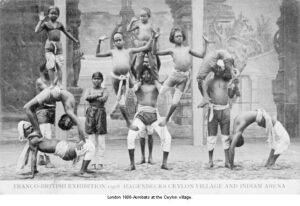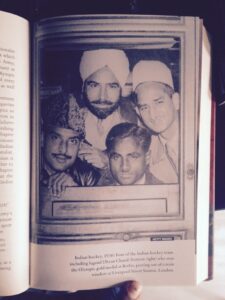ABSTRACT
India’s Olympic encounter has been a battle ground where an emerging nation’s internal dissensions were given full play: issues of national representation, colonial and postcolonial resistance, sports diffusion and participation at the global stage. This photo essay, with hitherto unseen photographs, seeks to detail some moments from colonial and early post-colonial India’s encounter of the world’s most successful sports spectacle. Each of the photographs used here seeks to explore the complex relationship between sports, identity, nationalism and internationalism in India. At the same time, it has been a conscious effort to come to terms with the philosophical debates that emerged in the course of India’s engagement with Olympic ideals, for example, the Indians not performing the Nazi salute in Berlin and creating a serious controversy and much heartburn for the organizers. All the photographs used are products of meticulous research – rare pictures that have never been seen before in the public domain. The fundamental motivation for this photo essay was to look back at India’s Olympic encounter on the eve of the 2012 London Games. The photographs bring to light the forgotten but fascinating journey of Indians at the Olympics and will, we expect, make way for further research by scholars. In documenting the Indian story from its origins in the 1920s and locating it in specific historical contexts and timeframes, these photographs are yet another attempt by the authors to resurrect India’s Olympic journey from a mere footnote, as in most tomes on Olympic history. Modern sport, as we know it, started as a global phenomenon at the turn of the twentieth century and India was an important strategic outpost. The nascent Olympic movement’s strategic alliance with the Young Man’s Christian Association (YMCA) in Latin America and subsequently with India draws attention to this fact. The movement sought to be global from its moment of conception; only later did particular regional connotations and dynamics emerge, making national Olympic stories more complex and compelling. Finally, the story of India’s engagement with Olympism was acutely political and provided a unique prism to understand the complex evolution of modern Indian societies through the lens of sport. It is important to put this in perspective as India gets ready to participate at the 2012 London Olympics, which promises to be a watershed event in the history of India’s Olympic sport
Colonial India’s Olympic encounter: a photo essay
Previous ArticleHybridity and subversion: the Olympic flame in India
Next Article Sibal is right, almost
Nalin Mehta
Nalin Mehta is Managing Editor, Moneycontrol, Chief AI Officer - Editorial Operations, Network18 and Non-Resident Senior Fellow, Institute of South Asian Studies, National University of Singapore. He is an award-winning Indian journalist, political scientist and author who has held senior leadership positions in major media companies and educational institutions; served as an international civil servant with the UN and the Global Fund in Geneva, Switzerland; taught and held research positions at universities and institutions in Australia (La Trobe University, ANU), Singapore (NUS), Switzerland (International Olympic Museum) and India (Shiv Nadar University, IIM Bangalore). Most recently, he has been Dean and Professor at School of Modern Media, UPES University. He has previously been Group Consulting Editor, Network18; Executive Editor, The Times of India-Online, Managing Editor, India Today (TV channel) and Consulting Editor, The Times of India. Mehta is the author of several best-selling and critically acclaimed books, including The New BJP: Modi and the Making of the World’s Largest Political Party (hailed as a ‘seminal’ work, No. 1 on Amazon’s bestseller lists for 26 consecutive weeks in 2022, and republished worldwide in several languages); India’s Techade: Digital Revolution and Change in the World’s Largest Democracy, India on Television (Asian Publishing Award for Best Book on Asian Media, 2009), Behind a Billion Screens (Longlisted as Business Book of the Year, Tata Literature Live, 2015) and Dreams of a Billion (2022 Ekamra Sports Book of the Year Award, co-authored). His edited books include Gujarat Beyond Gandhi (co-editor), Television in India and The Changing Face of Cricket (co-editor). Mehta is a DFID-Commonwealth scholar with a Ph.D in Political Science from Trobe University, Melbourne; M.A. International Relations from University of East Anglia, UK; and B.A. Journalism (Honours) from University of Delhi.




